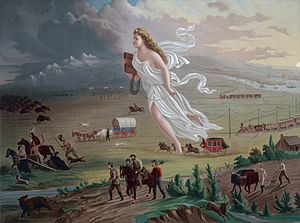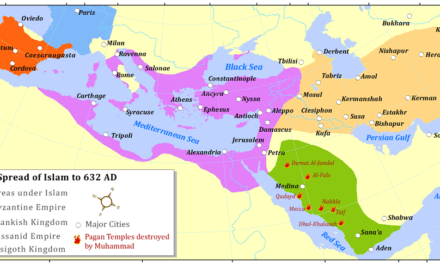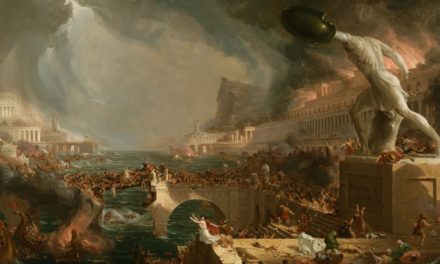The final episode of Communio Sanctorum. We look briefly at the reaction of some Protestants to Manifest Destiny. DL Moody, The Holiness Movement, Phoebe Palmer, The Azusa Street Revival.
This 150th episode of CS is titled The End.
150 episodes! And this is the rebooted v2. We had a hundred episodes in v1 before I started over again in an attempt to clean up the timeline and fill in some gaps.
When I first set out to do this podcast I had no idea it would become what it’s turned out to be. I’m not much of a web guy and depend on the skill of others to help me figure out how to run the website, link to iTunes, and work the tech. Stat programs for WordPress sites are difficult to sort out and figuring out how many subscribers there are to CS is a bit of a challenge. The stat plugin I use says we have over 20K unique visitors a week. I’m assuming that’s mostly people who check in to grab each episode.
When I began, I thought maybe a couple hundred would join in the journey. To have 20K subscribers & be nominated the last 2 years for the Podcast Awards is way beyond what I anticipated.
So, thanks to all of you faithful CS subscribers. You’ve made the journey a rewarding experience. And if that sounds like I’m ending the podcast, you assumed correctly. As I’ve sat down to write the scripts over the last few weeks, I’ve asked myself, “Is this the last episode?” But when I finished, I realized there’s still material to cover.
There always would be. We’ve come in our narrative to the end of the 19th C and broached the early yrs of the 20th. But we’ve neglected some important stories, such as the massive Protestant Missions outreach of the 18th and 19th Cs. As I mentioned in a recent podcast, there’s so much historical record for this era, if we start following every trail of Church history it’ll never end.
So yes, this is the last episode of this iteration of CS. 150 seems a nice round number to end on. For those who are interested, I’ll be taking a break to turn my full attention to the expanding task of leading a growing church for a while; several months at least.
Then I want to pick it up again with some series where we’ll go into a lot more depth in moments & movements in the History of Christianity.
Check back after the first of the year and see if we’ve started up again. If not, I’ll still post an update with some information on when we will start back up.
I’ll have more to say at the end of the episode . . .
High school students in the United States learn about Manifest Destiny in their US History course as Juniors. MD was a late 19th political idea that the USA was divinely appointed to occupy all of the North American continent. MD captured the imagination of many Americans and was fueled by politicians and journalists. But the “America” MD believed was ordained by God to cover the continent had a specific flavor. It was white and Protestant. That is Northern European white and Protestant! Hardcore MD advocates went so far as to say once the USA had claimed all North America, it would spread its influence over Central & South America as well, and bring the blessing of the American system to the rest of the world.
But there was trouble in America. The Civil War may have helped end slavery, but it did not bring about racial harmony. On the contrary, things got worse in the South following the War. The large numbers of European immigrants flooding US shores in the North put pressure on urban centers which saw people of various ethnic communities banding together for mutual support, exacerbating an already fragmenting American society. The melting pot was leaking, quickly. Southern European immigrants faced a hard time in discrimination and as settlement moved Westward, Hispanics also faced it.
Josiah Strong, general secretary of the conservative Evangelical Alliance announced God was about to bring forth a “final competition of races” in which the Anglo-Saxons would prevail because they had the “best form of government, the purest expression of Christianity, and the highest civilization.” So they would fulfill their God-given destiny of sweeping aside weaker races, assimilating worthy races, and shaping the rest so as to, as he said id, “Anglo-Saxonize” humanity.
If that sounds a bit like the maniacal ramblings of a failed Austrian artist with a tiny mustache and bad haircut, you know where you’ve heard those claims before. But Josiah Strong made them several decades before Hitler. And while he was what we’d call a conservative Evangelical, there were oodles of more liberal Christians who held precisely the same ideas because they were all caught up in the idea of MD.
But these ideas contrasted strongly with the reality of the United States itself, especially in the urban centers. Immigrants were exploited and lived horribly overcrowded conditions. They had virtually no contact with organized Christianity, and especially that of the Protestant form.
When Protestant leaders realized they had no presence in some of the neediest places of their own country, they went to work to remedy the situation. The Young Men’s & Women’s Christian Association was imported from England set up chapters.
Sunday schools were established and were such a hit that many churches ended up having a more vibrant Sunday School program than their other functions.
The camp meetings that had been such a boon to the frontier were imported to Eastern cities. Mass meetings and revivals became a major part of the urban religious scene. The central figure of these revivals was a shoe salesman from Chicago named Dwight Lyman Moody. Moody knew the USA considered itself a “Christian realm” but saw precious little religion in the sprawling metropolis he called home. He began bringing the unchurched to his church, but when it became clear to him the leaders there weren’t interested in ministering outside the sphere of their own members, he began an independent work. He got involved with the YMCA, where his zeal for evangelism he recognized and encouraged. While visiting the HQs of the YMCA in London in 1872, he was invited to preach for the first time. The response moved him to take up a preaching career, focusing on the masses of urbanites in England, then in the US. While Moody was innovative in his methodology for conducting mass meetings, his message was a simple presentation of the Gospel with a call to repent of sin and put one’s faith in Christ as the only Savior. He was sure the best way to improve the condition of the urban poor was conversion. So while he concentrated his efforts in large cities, he was loath to speak out against social ills. He’d rather spend his time and effort lighting candles than cursing the dark. His success spun up many imitators, and soon revivals became a part of the American religious landscape.
The challenge of addressing the plight of urban poverty generated some new movements & denominations. Some Methodists in both Great Britain & the US observed that their denomination had become quite middle-class, neglecting the poor, which they regarded as a fundamental departure from the teaching of their founder, John Wesley. Since it was among such the movement had been birthed, they sought a return to their roots. In England, this impetus gave rise to the Salvation Army, founded by Methodists William & Catherine Booth. The SA was known for its work among the poor, providing food, shelter, & employment to the needy. Because the condition of the poor in the US was similar to England, when the SA arrived there, it found a ready mission field.
Another group to emerge from the Methodists at this time were less concerned for the poor, but no less concerned for another distinctive that had been prominent in Wesley’s ministry – the Call to Sanctification. The Holiness Movement was born out of a desire to recapture and reinfuse this central fixture of primitive Methodism.
At first there were many disconnected groups that comprised the Holiness Movement. Over time, they consolidated in a few denominations. The largest was the Church of the Nazarene, began in 1908.
A leading voice in the Holiness Movement was Phoebe Palmer, who in 1835 began leading women’s prayer meetings. A few years later, men joined as well. Then she took her show on the road, preaching and teaching all over N American & Europe. Palmer advocated sinless perfection – that it wasn’t just possible; rather—it ought to be the goal of all believers to achieve absolute moral purity. Of course she was not without her critics, even from within her own denomination. She founded the Methodist Ladies’ Home Missionary Society, which brought relief to some of the most deprived urban areas of the US. Her work, along with the work of many others, contributed to what later became the American Feminist movement.
Worship in many of the independent holiness churches was filled with a new energy & vitality unseen and unheard in most of the older denominations. Meetings would occasionally see what was called an outpouring spiritual gifts; things like speaking in tongues, prophecies, miracles & healings. And while all such went by the wayside in most churches after a few years, in 1906 they re-emerged in spectacular fashion at the Azusa Street Mission in Los Angeles.
The first glimmers of something happened among a small group at a house of one of the members on Bonnie Brae Street. Pastor William Seymour, a former slave who’d been trained by a Pentecostal minister named Charles Parham. As the little group prayed, the Holy Spirit moved and people began speaking in tongues. More wanted to attend but the house was too small so they moved to the Azusa Street mission. It was there a critical mass was reached. From there, Pentecostal fire spread to the rest of the country.
There were both whites & blacks present at Azusa Street Revival, so the work spread to both group’s churches. It quickly spread beyond its Methodist roots to include Baptists & others. In 1914, a gathering of Pentecostals, as they were called, saw the birth of the Assemblies of God denomination. Eventually, other Pentecostal groups formed. Most of them were eager to alleviate the suffering of the urban poor. When that task seemed to be largely addressed, an initiative of international missions was launched. The vitality and innovative inertia of Pentecostals fueled a new wave of world mission that saw Pentecostalism become a main feature of the World Christian Movement and Global Christianity.
Well, That’s it for CS for now.
Yeah, I know, there’s a lot of stuff we didn’t cover. That’s where all you aspiring podcasters can buy a mic, install a recording and editing program and go to town – filling in what I left out.
And I’m sure there were some who listened to these podcasts & said, “This guy’s an idiot. I could do a better podcast than that.” Well, here’s your chance. Go for it. Why not pick It up here and do a podcast on the history of your denomination, movement, or group. If you take on the task, let me know so I can give it a listen.
As I said earlier, check back early 2017 to see if there’s a fresh episode or update.
And if you’re a glutton for punishment and just miss my annoying voice each week for 15 minutes, you’re invited to subscribe to the weekly podcast of the church here I serve as lead pastor – just go to calvaryoxnard.org. If you use iTunes as your podcast portal, do a search for Calvary Chapel Oxnard in the iTunes store.
Okay, well – That’s it. // Thanks so much for being a part of something special.







I’ve already said how much i appreciate what you have offered in the way of Church History. I hope that I have also conveyed the incredible significance and impact of those offerings. The sheer number of listeners to the podcast are a testament to this truth. So, once again, on behalf of all of us “aspiring amateur church historians”… thank you from the depths of our collective heart!
Though there is sadness with the realization that this is the “last” episode of The History of the Christian Church, I totally understand the need to back away so that you may give yourself more fully to your predominant role as pastor and shepherd of the local assembly you serve (how blessed they must be!) But I look forward with great anticipation of what offerings you may bring in the coming year, Lord willing… and since I’m convinced He “is willing,” I will wait with joy. 😉
As i am able I will continue to pray for you and yours the Father’s greatest blessings. I feel as though i have come to know a good friend. i would love nothing more than to meet up at a coffee shop and simply chat. Perhaps some day… if not in this life. maybe in New Jerusalem (because I am certain there will be coffee in heaven). God bless you, Lance. You are loved.
Lem,
The words “Thank You” don’t do justice to what I want to convey to you. How I wish I could see you face to face and say them to you personally so you would catch the weight of how appreciative I am for your kindness and the expression of your friendship.
I AM your friend, and lament that we don’t live near each other.
Tell me again where you live and if I am every in your area, will do my best to swing by for that cup of coffee.
I’m in Oxnard, in the north end of Southern CA, so if you’re ever out my way, for sure let me know.
Blessing, Friend!
Lance
You are more than welcome… and I meant every word.
I hail from the Midwest, Indiana in particular (and we do have good coffee!). And if I ever make it to the West Coast, I’ll look you up. I’ll try to connect with you via the Facebook page some time soon.
Blessings, friend!
Spectacular, much appreciate all the time effort and study that went into this. It was really informative and helps build my faith even more while at the same time hopefully making me more understanding of reasons why people choose not to believe and equipping me to perhaps shed some valuable insight. Again thanks alot.
Thanks Ron
Thanks very much Lance. I’ve really enjoyed these 150 episodes. I started in Jan 2019 and just listened to one after the other on iTunes. I just wanted to get the overview but several dates and names have still stuck (even at 1.5x speed!)..
I particularly unjoyed hearing the news about the church development away from Europe.
I am from Australia (Brisbane), your way with words is great and you love of history evident.
Some of my observations have been not to expect everyone to follow my Christian beliefs, focus on my relationship with God (thanks to Jesus) and that prayer is powerful, as is the Holy Spirit.
Thanks again, feared and joy to you and your family,
Brett, Thanks for the kind words and encouragement.
Now enjoy Season 2.
lance